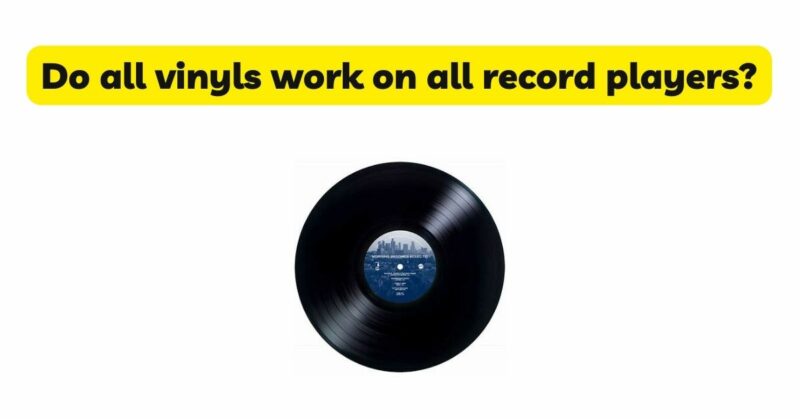The resurgence of vinyl records in recent years has led to a renewed interest in record players and turntables. Vinyl enthusiasts often delve into the world of record collecting, searching for their favorite albums in the classic vinyl format. However, one question that often arises is whether all vinyl records are compatible with all record players. In this article, we will explore the factors that determine record player compatibility and provide a comprehensive understanding of whether all vinyls work on all record players.
- Vinyl Record Formats:
Vinyl records come in different formats, each with its own characteristics. The most common formats are 12-inch LPs (long-playing albums), 7-inch singles, and 10-inch records. These formats vary in size, speed, and groove size, which can affect their compatibility with record players. For example, a 7-inch single may require a different size adapter to fit on a turntable’s spindle, while 10-inch records may not fit properly on turntables designed for 12-inch LPs.
- Record Player Speeds:
Record players typically have two speed settings: 33 1/3 revolutions per minute (RPM) for LPs and 45 RPM for singles. Some record players also offer a third speed option of 78 RPM, primarily used for older shellac records. It is essential to match the record’s speed with the appropriate setting on the turntable to ensure proper playback. Playing a record at the wrong speed can result in distorted sound or damage to the record.
- Tonearm and Cartridge Compatibility:
The tonearm and cartridge are critical components of a record player. The tonearm holds the cartridge, which houses the stylus that tracks the record’s grooves. Different cartridges have varying tracking forces and compliance levels, which can impact their compatibility with specific vinyl records. High-compliance cartridges are more forgiving with older, worn records, while low-compliance cartridges are better suited for new and well-preserved vinyls. Additionally, some record players feature adjustable tonearms, allowing users to fine-tune the tracking force to match the record’s requirements.
- Groove Size and Playback Issues:
Vinyl records have different groove sizes, which can affect their compatibility with record players. Standard records use microgrooves, while some older records, particularly those from the 78 RPM era, have wider grooves. Playing a record with wider grooves on a standard turntable can result in poor tracking, skipping, or even damage to the stylus. However, modern record players typically have adjustable tonearms or additional stylus options to accommodate different groove sizes.
- Specialized Vinyl Records:
Beyond the standard formats and groove sizes, there are specialized vinyl records that may require specific record players for playback. For instance, picture discs, shaped records, or records with unusual sizes or features might have limited compatibility. These records often require special turntables designed to handle their unique characteristics. It’s essential to research the requirements of specialized vinyl records before attempting to play them on a standard record player.
Conclusion:
While vinyl records have made a remarkable comeback, it’s important to understand that not all vinyls work on all record players. The compatibility between vinyl records and record players depends on various factors such as format, speed, tonearm, cartridge, groove size, and specialized requirements. By considering these factors and ensuring a proper match, vinyl enthusiasts can enjoy an optimal listening experience and preserve the integrity of their record collections. Remember to research the compatibility requirements of specific vinyl records and consult experts or manufacturers if needed. With the right setup, you can fully immerse yourself in the captivating world of vinyl and indulge in the nostalgic warmth of analog sound.


